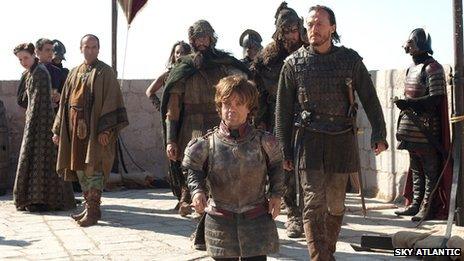Game of Thrones tops TV show internet piracy chart
- Published

Game Of Thrones is largely filmed in Northern Ireland, and is shown on Sky in the UK
Game of Thrones has emerged as the most-pirated TV show over the internet this year, according to news site Torrentfreak's latest annual survey.
It said one episode of the series had racked up 4,280,000 illegal global downloads - slightly more than than its estimated US television audience.
The site said that overall there had been a "small increase" in the amount of illegal sharing, external.
That was despite a "levelling out" of the activity the previous two years.
The rise also followed increased efforts to shut down or block websites providing access to copyright infringing material.
Investigations by the US, Mexican and Ukrainian authorities led to two of the best known file-sharing services disappearing earlier this year - digital locker service Megaupload and Bit Torrent link site Demonoid.
The administrators of Newzbin2 - a site which aggregated links to illegally copied material sourced from Usenet forums - also abandoned the operation after the UK courts forced internet service providers (ISPs) to block access.
In addition, UK-based Surfthechannel went offline after its owner went on trial for "facilitating" copyright infringement - a crime which resulted in him receiving a four year prison sentence.
Several countries ISPs have also been ordered to block The Pirate Bay, although political activists at Europe's Pirate Parties continue to offer proxy-based workarounds.
Delayed broadcasts
Despite all the closures, one episode of Game of Thrones racked up 4,280,000 illegal global downloads, according to Torrentfreak. That was slightly more than than its estimated US television audience.
The level of piracy may be linked to the fact that the TV company behind it - HBO - does not allow Netflix, Hulu, Amazon Prime or other US streaming services access to its programmes. It instead restricts them to its own HBO Go online product, which is only available to its cable subscribers.
Outside the US, Torrentfreak noted that Australia was responsible for a disproportionate amount of illegal copies of Game of Thrones and suggested this may have been because episodes were broadcast locally a week later than in the US.
Torrentfreak's editor acknowledged that, despite his findings, HBO might still want to keep its current model.
"Not all of the people who pirate do it because it's free - availability is also a big factor," Ernesto Van Der Sar told the BBC.
"Most of the titles in the top 10 list are behind paywalls and are not distributed very widely. If TV companies offered them online to a broader audience, piracy would be lower than it is now.
"But I'm not sure that would be best for their revenues as they rely on expensive subscriptions which they still sell a lot of. If they allowed people to download individual episodes from Netflix, for example, they might not make as much money."
Ditched laws
The latest effort to combat piracy is a newly announced action plan by Russia and the US.
It involves the two countries:
Co-ordinating efforts with rights holders and law enforcement agencies to force copyright infringing content off the net and take action against those responsible for putting it online.
Pledging to seize and destroy equipment used to make the pirated files.
Working together on legislation, including plans for a Russian law to make ISPs liable for piracy carried over their networks.

Homeland has been a ratings hit for Showtime despite high levels of piracy
"Intellectual property rights not only protect our creators and innovators, but also promote foreign investment, economic development, and job creation." said US Trade Representative Ron Kirk, external.
It follows success at introducing other anti-piracy action over the past year.
A series of website blackouts and protests led to the US's House of Representatives abandoning its Stop Online Piracy Act (Sopa) and the Senate its Protect Intellectual Property Act (Pipa) in January.
An attempt to bring in an international treaty - the Anti-Counterfeiting Trade Agreement (Acta) - was also derailed after the European Parliament rejected it in July.
However, more recently countries have signalled they intend to press forward with anti-piracy efforts,
In September, Japan changed the law to introduce a maximum two year jail sentence for users found guilty of downloading pirated files.
Major ISPs in the US have announced plans to launch a "six strikes system" early next year, under which suspected pirates would be sent a series of warning letters before facing bandwidth throttling and other punitive measures. And the UK also plans to introduce a letter-writing scheme in 2013.
- Published23 October 2012
- Published2 October 2012
- Published17 July 2012